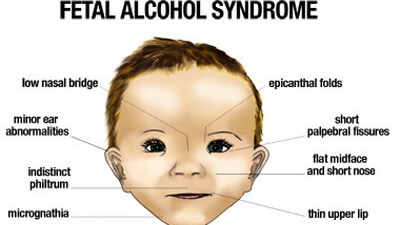Alcohol & Pregnancy: Three Myths, Three Facts
&srotate=0)
Why risk it? Prevent fetal alcohol spectrum disorder by putting down the drink.
Drinking alcohol, even small amounts, is not safe during pregnancy. Substances can pass through the blood to the umbilical cord, limiting babies’ healthy development and causing fetal alcohol spectrum disorders (FASD), among other issues. Unlike other birth-related disorders, FASD can be hard to track because it often goes undiagnosed. Some experts suggest up to 5 percent of school-age children could suffer from FASD, which is 100 percent preventable if a mother avoids alcohol completely during pregnancy. As diagnosis rates rise, the Someday Starts Now campaign from the Texas Department of State Health Services (DSHS) wants to remind health care and other service providers that alcohol is dangerous at any point during pregnancy, even before a woman knows she’s pregnant. People born with FASD often battle lifelong issues, including problems affecting physical, behavioral and learning abilities. According to the CDC, a mother who drinks during pregnancy could have a child with symptoms ranging from mild to severe, poor memory, physical deformities, and vision or hearing problems, among others. A few common myths could put more children in danger of this preventable disease. Help women learn the facts about FASD by dispelling these dangerous myths:
MYTH: It’s fine to drink some wine or beer during pregnancy, especially in the third trimester.
FACT: Even small amounts of alcohol can put a baby at risk, regardless of the stage of pregnancy, because a baby’s brain and nervous system are developing in all three trimesters. Beer, wine, and spirits are equally dangerous and can all contribute to FASD.
MYTH: If a woman is thinking about getting pregnant, it’s still okay to drink alcohol.
FACT: Even in the weeks before a woman learns she’s pregnant, a baby is rapidly developing and can be harmed by alcohol. It can take up to six weeks before a woman realizes she’s pregnant, and drinking during that time can dramatically impact the early development of a baby. Plus, nearly 50 percent of U.S. pregnancies are not planned, which means women drinking during that time put their children at risk for lifelong problems.
MYTH: The effects of drinking alcohol during pregnancy disappear as the child grows older.
FACT: Drinking alcohol during pregnancy can affect a child forever. The child might have brain damage, a low IQ, problems with behavior and learning, or abnormal facial features. Bottom line, alcohol, and pregnancy don’t mix. However, if a woman is drinking during pregnancy or drank without realizing she was pregnant, it’s not too late to stop. A baby’s brain develops throughout pregnancy, so the earlier mom stops drinking, the better it is for her baby. By encouraging healthy habits and talking about the risks associated with alcohol during pregnancy, you can help reverse FASD statistics for the better and help every Texas baby have a healthy, happy first birthday—and all the birthdays after that.